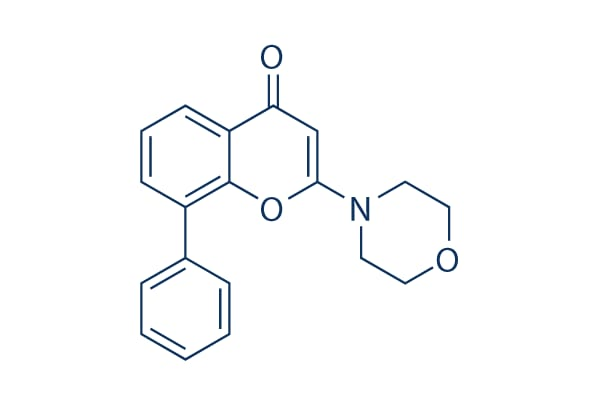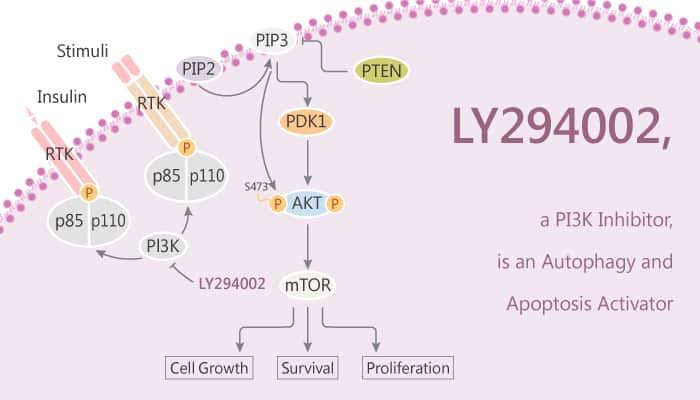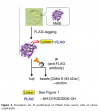LY294002
It is the first novel synthetic compound that is used to inhibit the actions of PIK3. It is exclusively considered that LY294002 has a selective inhibitory role for PIK3, but the latest research indicated that it not only inhibits the PIK3 but also inhibits the other lipid kinases as well along with the inhibition of some unrelated proteins. This PI3K, which is an abbreviation of phosphatidylinositol 3-kinases, is an enzyme that belongs to the kinase family and has important functions related to some cellular signals for growth, survivability, proliferation, and for specified functions of particular cells. So, its inhibition can disrupt various cellular phenomena like transcription dynamics or protein trafficking, etc. As we have discussed earlier that LY294002 can also inhibit the non-lipid kinases like GSK3β, CK2, mTOR, and GSK3β. Studies showed that the phenomenon in which LY294002 effects are observed on the cellular functions which are independent of the PIK3 is due to the inhibition of these 3 kinases by this synthetic compound. One of the three kinases, CK2 serine/threonine kinase has an important role in various cellular. It is essential for the activation of the factors for the transcription process along with the activation of signaling proteins. The study also suggests that, this kinase enzyme overexpresses in various cancerous conditions. So, it would be a great use of LY294002 for cancerous cells to inhibit their growth. LY294002 blocks the CK2 kinase by making a hindrance in the calcium and phospholipase signaling. Similarly, GSK3β has an essential role in the regulation of glycogen metabolism by inactivating the enzyme for glycogen synthesis (glycogen synthase).

Figure 1: structure representation of LY294002
One of the studies conducted on the effects of LY294002 suggested that it can be used for the treatment of human nasopharyngeal carcinoma conditions. It is because it has the ability to inhibit the action of Phosphatidylinositol 3-kinase (PI3K). Different studies stated that this PI3K/AKT signaling is an important one for the survivability and growth of cancer cells along with the other cellular events and release of growth factors. Particularly AKT signaling pathway maintains the balance between the cell survivability and apoptosis of the cell. Previously published studies showed that the PI3K produces the second messenger PIP, which then translocates the AKt to the plasma membrane. Here it gets phosphorylated at T308 and S473 domains. Now this phosphorylated AKt regulates the various proteins that are involved in cellular proliferation, cell adhesions, and neovascularization. AKT also has the ability to inhibit the apoptosis of the cells by interacting with the cells and phosphorylating the pro-apoptotic proteins. Studies stated that, this PI3K/AKT signaling pathway is activated in various cancerous conditions, including, renal, gastric, and lungs cancers and help cancer to further proliferate. More importantly, it is also mentioned that this activated signaling pathway not only proliferation the cancer cells, but also provides the ability to cells to show resistance against chemotherapy and radiotherapy, etc. When these cancer cells are treated with PI3K inhibitors like LY294002, they inhibit the PI3K signaling along with the de-phosphorylation of the T308 & S473domains. This will result in the inhibition of the cell cycle of the cancer cells, and cell arrest at the G1 phase (due to the inhibitors p27 and PTEN which are cyclin-dependent) this leads the cells toward apoptosis. In this study, they treated the NPC CNE-2Z cells with LY294002. They found that it has the ability to inhibit the growth and proliferation of the cancer cells through induction of the apoptosis but this action is dose-dependent. All this happens because of the decrease in the level of phosphorylation upon increasing the administration of LY294002. This can be used to treat various carcinoma conditions in humans. One of the studies published on this novel compound also confirmed its anti-proliferative and apoptotic effects in pancreatic carcinoma of humans. As we know that the PI3K/AKT signaling pathway is also important for normal cells to maintain cellular processes through homeostasis. So, it is essential to consider that it should not be used in such quantity that, it would show unacceptable toxicity effects in normal cells. Normally researchers stated that, it can be used twice a week at 100mg/kg of the body weight. This study also exhibits that, LY294002 dose administered at 50-75mg/kg of B.W concentration is sufficient enough to show obvious inhibition in the tumor cells proliferation along with the induction of apoptosis in CNE-2Z NPC xenograft tissues. Along with the dose-dependent manner, its action is also time-dependent. Normally in CNE-2Z cells, the phosphorylation of the AKT results in the inactivation of the caspase 9 enzyme. So upon administration of LY294002, this will result in the activation of the caspase 9 enzyme that in return cause initiation of the apoptosis mediated by the mitochondria pathway of caspase.

Figure 2: mechanism of action of LY294002
Similarly, due to its ability to inhibit the PI3K signaling pathway, it can be used to reduce the resistance for Sorafenib, which is extensively used to treat individuals suffering from acute myeloid leukemia. This AML has a very poor prognosis because of the development of the ITD mutation in FMS-like tyrosine kinase 3. This Sorafenib can be used to treat a wide variety of cancer including hepatocellular carcinoma and advanced renal carcinoma. Along with these problems, AML cells are resistant to Sorafenib and have ITD mutation. Studies stated that this resistance is developed in these cells due to the activation of the PI3K/Akt signaling pathway along with the mitochondrial dysfunction that results in the overproduction of ATP and enhanced glycolytic activity of the cell due to the fewer target proteins FLT3. This sufficient ATP and glycolytic activity result in the high survivability of the cancer cells. So, the administration of the LY294002 along with the Sorafenib can treat acute myeloid leukemia. It is because as we have discussed LY294002 inhibits the PIK3/Akt signaling pathway. This will result in a decrease in the drug resistance for Sorafenib produced by LT3-ITD mutant cells of acute myeloid leukemia by decreasing the glycolytic activity through suppression of the enzymes needed for glycolysis, along with the production of lactate that induces apoptosis of cancer cells.













Comments